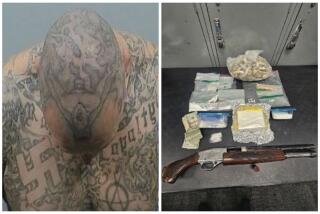Trial Begins for 7 Accused of ‘Brass-Knuckle Therapy’ in Loan-Sharking
- Share via
The trial of seven reputed members of a Chicago crime family, accused of trying to move in on loan-sharking and illegal bookmaking operations in Southern California and Las Vegas, began Wednesday with federal prosecutors accusing the men of using “brass-knuckle therapy” to force borrowers to repay loans.
Collectors doubling as enforcers were not adverse to “giving the knee” to some borrowers who were late in repaying loans with interest payments approaching 1,000%, Assistant U.S. Atty. George Rosenstock said.
The illicit schemes, Rosenstock said in his opening statement, were directed by the reputed head of the ring, Vito Dominic Spillone, 48, from the offices of a wholesale food supply company he owns in South El Monte.
Attorneys for the seven men accused in a 22-count federal indictment returned in Los Angeles last July argued, however, that the government’s case is based “on a parade of bank robbers, scam artists, perjurers and thieves.”
Testimony from these men would “not (be) credible or believable,” Anthony Brooklier, one of the defense attorneys, told the jury.
According to prosecutors, Spillone moved to Southern California in 1977 with the permission of organized-crime leaders in Chicago in an attempt to set up loan-sharking and illegal bookmaking operations. His principal target was poker club patrons.
Spillone, who spent five years in federal prison for loan-sharking activities in Chicago, intended to establish an organized-crime family in Los Angeles, prosecutors said.
A three-year FBI investigation showed that all seven men were members and associates of a criminal “family” that operated with the consent and the permission of others in Chicago, the indictment said.
In his opening statement to the jury, Rosenstock cited instances in which Spillone pressured loan sharks and borrowers alike.
According to Rosenstock, one loan shark was approached by Spillone’s men and was asked, “Who gave you permission to put money out on the streets?”
On other occasions, borrowers were summoned to meetings where, Spillone, seated in a white limousine, told them his “friends are not happy you’re late (with loan payments),” Rosenstock said. After that, he said, borrowers were on time with payments.
The reputed No. 2 man in the alleged ring is John James Barro, 46, the operator of an Anaheim-based chain of pizza parlors.
Barro approved many of the loans, ranging from $200 to $40,000, made by Spillone’s group, Rosenstock said. Annual interest charged was anywhere from 100% to 1,000%, he added.
Other defendants facing the racketeering and extortion charges in the case are John Clyde Abel, 41, of Chicago; Frank Serrao, 56, Los Angeles; Joseph Bolognese, 52, and Frank Citro, 39, both of Las Vegas, and John Meccia, 51, La Salle, Ill.
Rosenstock and other prosecutors admitted in court that much of the testimony against the seven defendants will come from convicted felons.
However, Rosenstock added, every accusation against the defendants will also be substantiated by loan-sharking records kept in Spillone’s office and by FBI tape recordings made in 1980 and 1981.
Attorneys for the defendants seized upon that admission as the major argument in their defense.
Spillone’s attorney, Richard Sherman of Los Angeles, said two major witnesses against his client were convicted on a variety of offenses, including mail fraud, writing bad checks and counterfeiting, and had agreed to testify against Spillone in return for favorable treatment in their cases.
Sherman and other defense attorneys indicated that few of their clients will testify during the trial, which is expected to last six weeks before U.S. District Judge Matt Byrne.
More to Read
Sign up for Essential California
The most important California stories and recommendations in your inbox every morning.
You may occasionally receive promotional content from the Los Angeles Times.










